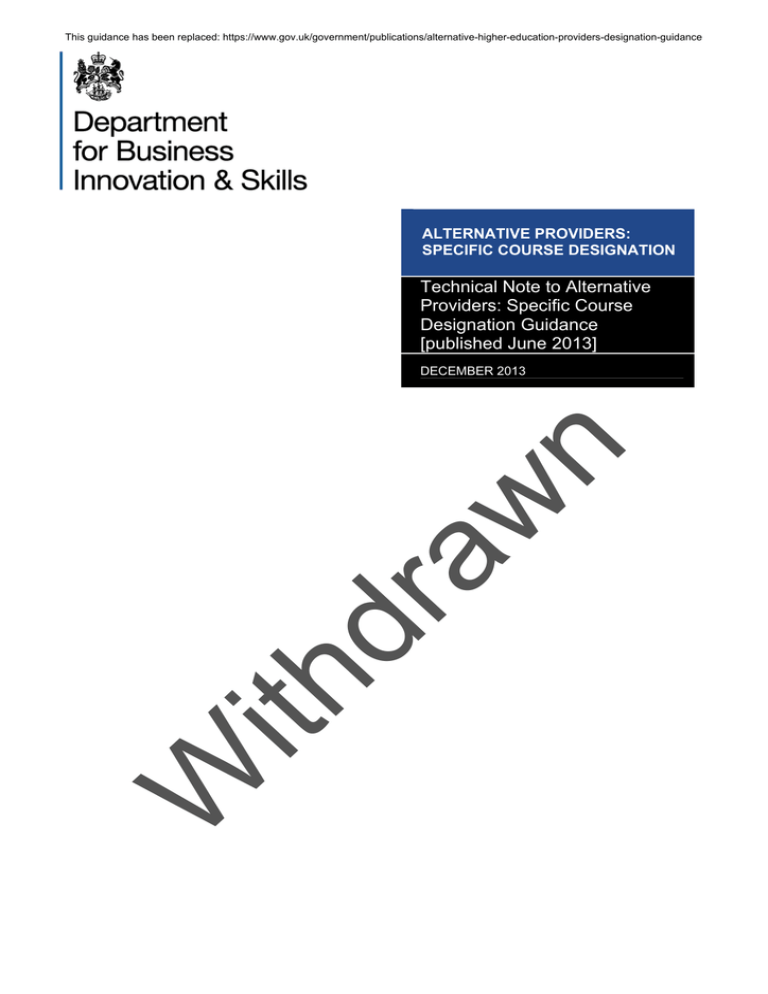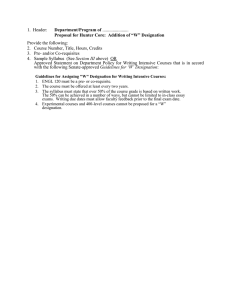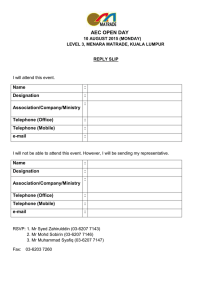Technical note to alternative providers
advertisement

This guidance has been replaced: https://www.gov.uk/government/publications/alternative-higher-education-providers-designation-guidance ALTERNATIVE PROVIDERS: SPECIFIC COURSE DESIGNATION Technical Note to Alternative Providers: Specific Course Designation Guidance [published June 2013] W ith dr aw n DECEMBER 2013 This guidance has been replaced: https://www.gov.uk/government/publications/alternative-higher-education-providers-designation-guidance Contents Introduction ..................................................................................................................................... 3 Summary of Key Principles, Changes and Requirements .......................................................... 4 Change of ownership and Control............................................................................................. 4 Designation Enforcement: Sanctions and De-Designation ....................................................... 4 Change of Ownership and Control................................................................................................ 5 New Guidance on the Change of Ownership and Control of an Alternative provider ............... 5 The rationale for the requirement.............................................................................................. 5 What constitutes change of control ........................................................................................... 5 n Timescale and process for applying for designation ................................................................. 6 aw Providers at Risk of going into Administration........................................................................... 7 Criteria prospective owners will be expected to meet ............................................................... 7 Designation Enforcement .............................................................................................................. 8 dr Guidance on Designation enforcement: Sanctions and De-designation for Alternative Providers ................................................................................................................................... 8 Suspension of Payments: ......................................................................................................... 8 ith Action that BIS or SLC will take following suspension of payment: .......................................... 8 W Action that BIS will take following the conclusion of investigation:............................................ 8 This guidance has been replaced: https://www.gov.uk/government/publications/alternative-higher-education-providers-designation-guidance Introduction This is a technical note to the `Alternative Providers: Specific Course Designation Guidance that was published 5 June 1. This technical note provides further detail and clarity on: Change of Ownership and Control Designation Enforcement : Sanctions and De-Designation W ith dr aw n This guidance has been replaced: https://www.gov.uk/government/publications/alternative-higher-education-providers-designation-guidance Summary of Key Principles, Changes and Requirements Change of ownership and Control 2. This guidance updates the June 2013 guidance on Change of Ownership. It establishes the principle that prospective providers are required to apply for specific course designation in their own right if they acquire specifically designated courses as part of the educational concern where there has been a change of control, ownership or significant beneficial interest. 3. This includes where there has been a 50% change in the balance of control over the provider by a legal person or group of legal persons in terms of ownership of the provider and a 50% change in control of members for a company limited by guarantee, 50% change of trustees for a charity and 50% change of partners for a partnership. n Designation Enforcement: Sanctions and De-Designation aw 4. The guidance sets out the action that BIS will take in relation to: Suspicions that a provider is claiming payments to which it is not entitled Failure to notify a change of ownership W ith dr This guidance has been replaced: https://www.gov.uk/government/publications/alternative-higher-education-providers-designation-guidance Change of Ownership and Control New Guidance on the Change of Ownership and Control of an Alternative provider 5. This guidance updates the 5th June 2013 guidance Alternative Providers: Specific Course Designation Guidance for Providers - Criteria and Conditions, June 2013) and provides further information on Change of Ownership/Change of Control of an alternative provider with specific course designations. For the purposes of specific course designation a change in control refers to a change of 50% or more in the control of the organisation e.g. 50% or more change in the shareholding or the beneficial interest. aw n 6. A change in control will trigger a review of the specific course designation. The new individual(s) in control will be required to apply for specific course designation in their own right in order for those courses to retain specific course designation if they acquire specifically designated courses as part of the educational concern. As specific course designation applies to each course where an existing Alternative Provider (AP) acquires a new AP, a review of the designation would still be required. In practice this could be a straightforward assessment of evidence that may already have been provided to HEFCE for assurance that the Quality and FSMG criteria continue to be satisfied following the acquisition and that any new courses are eligible for designation for student support purposes. 7. This guidance comes into effect from the date of publication. The rationale for the requirement, explanation of what will constitute a change of ownership or control and the process and timescales for application are as follows: dr The rationale for the requirement W ith 8. Legally, there is no right to automatic transfer of designation to a new owner, therefore where a change of ownership or control is under consideration, for students to be able to continue to access student support, the prospective new owner(s) or those in future control of the provider must reapply for specific course designation within the timescale specified by the Department and meet the designation criteria in their own right. A new designation assessment is necessary to ensure the new owners meet the financial sustainability, management and governance, and quality of provision criteria introduced from 2013/14 to safeguard the service and educational outcomes for students. The assessment may take account of the financial, management and governance arrangements of any subsidiary, parent company or linked organisations. What constitutes change of control 9. Change of control, ownership or significant beneficial interest will trigger the need to re-apply for designation. This could be from a change in owners, directors or senior managers and would arise where this results in: A 50% change in the balance of control over the provider by a legal person or group of legal persons in terms of ownership of the provider. This does not mean a specific This guidance has been replaced: https://www.gov.uk/government/publications/alternative-higher-education-providers-designation-guidance proportion of shares would be involved as this will depend on the balance of shareholding across the company. The principle will be where control of 50% or more of the shares and/or beneficial interest changes. The same principle of a 50% change in control applies to other business models. For example for a company limited by guarantee, a change of control arises where there is change of 50% of members; for a charity, 50% of trustees; for a partnership, 50% of partners. Beneficial interest refers to the right of individuals or companies to receive benefits on assets held by the provider. A change in beneficial interest may arise, for example, where there is a change in the recipients of the provider’s profits (e.g. as a dividend or by other means) n 10. Any change of ownership or control that meets the above criteria must be notified immediately the change 50% has been reached any time after the provider’s courses were originally designated. For example if a company had five shareholders, each with 20% shareholdings at the time of designation and two shareholders sold their shares, there would not be a change of ownership or control until a third shareholder sold their shares, i.e. 60% of shares have now changed hands. Timescale and process for applying for designation dr aw 11. New students at any provider where a change of ownership or control occurs would not be able to access student support until BIS has approved the specific course designation application. Students who are in receipt of student support when the change of ownership takes place will be able to continue to access student support for the duration of their course. The Department will not deem the change in ownership or control to be completed for course designation purposes until the prospective owners have met the conditions of specific course designation. It is recommended that prospective owners are made aware of this caveat before the completion of change in ownership or control. W ith 12. Providers should notify HEFCE immediately of an imminent change in ownership or control and before any change in acquisition. This will trigger the review of the prospective owner or of those in control of the provider for specific course designation. Prospective owners will have 3 months from the date of notification to submit the specified information for the specific course designation assessment. BIS will undertake to provide a decision within 3 months of receiving the full information. Providers should be mindful that the overall timescale following notification may therefore be up to six months, although in practice the typical timescale would be 6 weeks from the receipt of full information. 13. Whilst the prospective owner or new individual with control over the provider is being reviewed, existing students will continue to be able to access student support under the existing specific course designations. New students will however be unable to access student support until the prospective owners have been reviewed and designations approved for each course. We expect the change in ownership or This guidance has been replaced: https://www.gov.uk/government/publications/alternative-higher-education-providers-designation-guidance control to be a sequential process with ownership or control changing once the new provider has been reviewed and approved by BIS. 14. Once a provider has courses designated following a change in ownership/control, then BIS reserve the right to time limit the designation. Providers at Risk of going into Administration 15. The exception to these arrangements would be where a provider is failing financially and a change in ownership may be needed to avoid the provider going into administration or to enable a provider in administration to be bought and continue trading. In such cases the Department will consider the change in control arrangements as a matter of priority to avoid hardship to students. 16. The Provider will need to demonstrate that the provider is failing financially and that extraordinary treatment is necessary. n 17. In practice this is likely to mean that existing designations held by the failing provider are assigned temporarily to the new provider. Once the Department is assured that the new provider satisfies the Quality and FSMG criteria are met the specific course designation will be approved in respect of the new provider. Criteria prospective owners will be expected to meet dr aw 18. Prospective owners will be expected to satisfy the specific course designation criteria introduced from AY 2013/14. These include a recent and successful QAA review, financial sustainability, management and governance criteria and from AY 2014/15 Student Number Controls. HEFCE is administering the specific course designation applications. The application form can be found in the following link: Application form: Specific-course designation for alternative providers of higher education [www.hefce.ac.uk] ith 19. There are a number of additional criteria that need to be met in addition to the 2013/14 criteria. Provided the core requirements for a successful QAA review and FSMG criteria are met these additional checks are unlikely to delay the specific course designation application. 20. We would need assurances over the “transfer” of Tier 4 license, if applicable, for those alternative providers for whom the ability to recruit international students is material. W 21. Where the existing provider is financially weak, we would also need to see a fully costed business plan as part of the application including planned actions to address any underlying problems. 22. If the `acquiring provider’ has a history of breaching a Student Number Control this may have a negative impact on the assessment of the specific designation application. 23. Failure to meet any and all of this criteria could result in the designation not being approved or withdrawn. This guidance has been replaced: https://www.gov.uk/government/publications/alternative-higher-education-providers-designation-guidance Designation Enforcement Guidance on Designation enforcement: Sanctions and De-designation for Alternative Providers Suspension of Payments: 24. SLC may immediately suspend payments (tuition fee loan payments to providers, and maintenance payments to students) if BIS or the SLC has reasonable grounds to believe that a provider is not complying with the terms of its designation. 25. The circumstances that may be expected to lead to a suspension of payments include (but are not restricted to): Reasonable grounds that a provider may be claiming payments to which it is not entitled, for instance because students are not studying a designated course, are not in attendance, or there has been systematic misrepresentation of students’ eligibility. Failure by a provider to notify a HEFCE of a change of control or other material adverse change that bring under question the ongoing sustainability and/or governance or that could affect the student interest.. aw n Action that BIS or SLC will take following suspension of payment: 26. In the event that a decision is taken to suspend payments, BIS will write to the provider within 5 working days, setting out the nature of the concerns. dr 27. The provider will be given 14 working days to comment and provide evidence. If necessary a meeting between the BIS and SLC, where appropriate, and the provider will be arranged to discuss the concerns. ith 28. Following the completion of any necessary investigations, the provider will be informed of whether further action is proposed by BIS, and, in the event that action is proposed, will have 5 working days to comment. Action that BIS will take following the conclusion of investigation: W 29. The action taken may include: Immediate withdrawal of the provider’s course designations for all students; Withdrawal of the provider’s designations in respect of new students Issue of an enforcement notice specifying actions to be taken by the provider and the timescale for completing those actions. This guidance has been replaced: https://www.gov.uk/government/publications/alternative-higher-education-providers-designation-guidance Failure to comply with an enforcement notice within the specified timescale may lead to a withdrawal of designation. W ith dr aw n 30. Providers should note that BIS may issue an enforcement notice in respect of any relevant matter without having first suspended payments. Failure to comply with such an enforcement notice within the specified timescale may lead to a withdrawal of designation. ith dr aw n This guidance has been replaced: https://www.gov.uk/government/publications/alternative-higher-education-providers-designation-guidance © Crown copyright 2013 W You may re-use this information (not including logos) free of charge in any format or medium, under the terms of the Open Government Licence. Visit www.nationalarchives.gov.uk/doc/open-government-licence, write to the Information Policy Team, The National Archives, Kew, London TW9 4DU, or email: psi@nationalarchives.gsi.gov.uk. This publication available from www.gov.uk/bis Any enquiries regarding this publication should be sent to: Department for Business, Innovation and Skills 1 Victoria Street London SW1H 0ET Tel: 020 7215 5000 If you require this publication in an alternative format, email enquiries@bis.gsi.gov.uk, or call 020 7215 5000. BIS/13/1322


